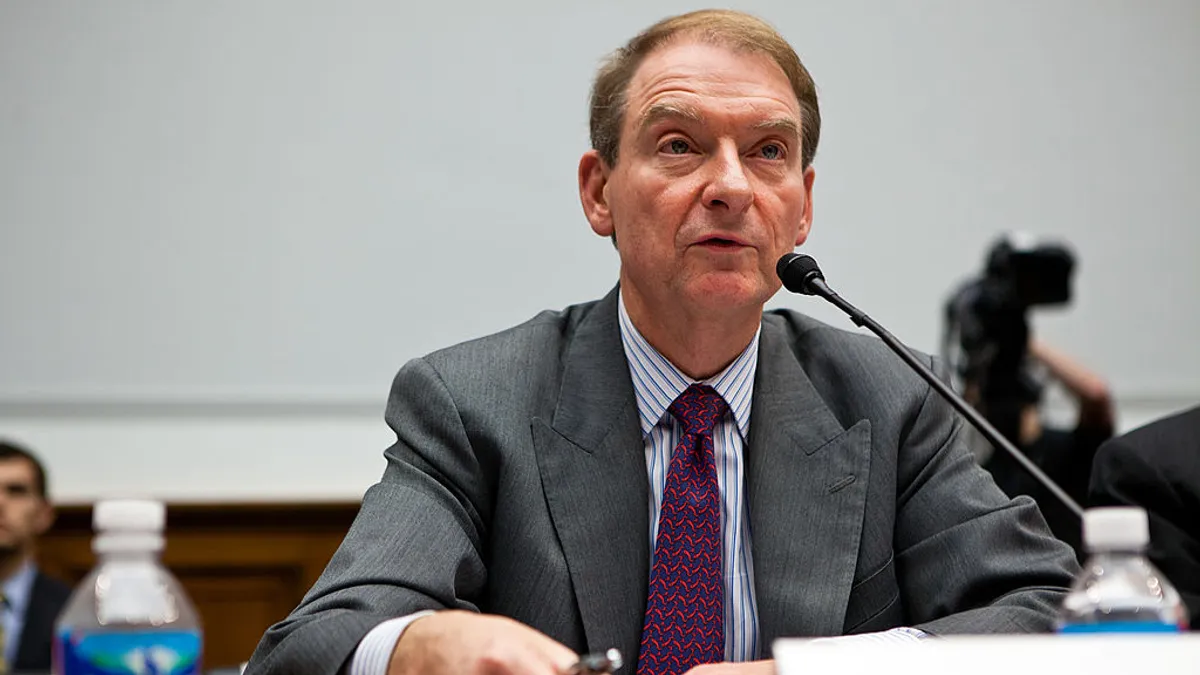Dive Brief:
- Donald Trump has tapped Paul Atkins, a financial services adviser and former regulator, to lead the Securities and Exchange Commission, according to a Wednesday statement shared by the president-elect on his social media platform Truth Social.
- Atkins is currently the CEO of Patomak Global Partners, a fintech and risk management consultancy he founded in 2009. Prior to setting up the firm, Atkins served as an SEC commissioner from 2002 to 2008, where he pushed for more transparency and consistency in the agency’s decision-making and enforcement activities, per his biography on Patomak’s website.
- The appointment sparked concerns from ESG experts who expect the new chair to undo many of the climate and social regulations and proposals brought forward by current SEC Chair Gary Gensler. “I think across the board, we're going to see greater deference to industry prerogative [and] greater efforts to diminish the effects of or the influence of ESG proposals in the mix,” Michael Posner, director of the Center of Business and Human Rights at New York University’s Stern School of Business, told ESG Dive Thursday.
Dive Insight:
Trump called Atkins a “proven leader for common sense regulations” in his Dec. 4 post. The president-elect said the former regulator “believes in the promise of robust, innovative capital markets that are responsive to the needs of investors” and “recognizes that digital assets & other innovations are crucial to Making America Greater than Ever Before.”
Atkins’ Patomak Global Partners has played an active role in advising crypto companies on how to manage risk and adhere to compliance requirements as they launch “innovative new products,” per its website. The firm serves as an adviser to cryptocurrency exchanges, blockchain and digital token projects, in addition to Fortune 500 companies, financial firms and banks that operate in the digital assets space.
Atkins’ crypto-friendly views stand in stark contrast to Gensler’s. The SEC, under Gensler’s tenure, has initiated enforcement actions against several major U.S. crypto companies, including Coinbase, Kraken and Consensys.
Atkins has also offered differing views from Gensler on climate-related disclosures.
When the Gensler-led agency first proposed the climate-risk disclosure rule in March 2022, Atkins — along with other former SEC commissioners and chairmen — penned a comment letter to the agency in June of that year. Atkins and the fellow former commissioners said the proposal “oversteps the Commission’s congressionally delegated regulatory authority.” The letter’s signatories also added that the “Commission’s rulemaking powers simply do not authorize it to require disclosure of the vast quantities of immaterial information” as described in the proposal.
Gensler’s original proposal required public companies to disclose a number of details related to how they manage climate risk, their scope 1 and scope 2 emissions, and scope 3 emissions “if material” or if the company has set a target that includes scope 3.
The final rule approved in March, however, dropped scope 3 emission disclosure requirements and scaled back scope 1 and scope 2 reporting requirements. The agency decided to stay the rule in April in the wake of several legal challenges questioning its authority to mandate such disclosures. Gensler previously told reporters the SEC had received over 24,000 comments since first proposing the rule in 2022.
Posner told ESG Dive that the new SEC administration may also roll back to the notion that “ESG considerations are not material and should not be part of decision-making,” when defining fiduciary duty. He added that the Atkins-led agency would likely have a “light footprint” and operate as a “laissez-faire administration” when it comes to regulating the industry.
Atkins, according to Posner, is a “free marketeer” who believes in the notion that the government should not interfere in matters that economists call “externalities.” He added that Atkins would most likely reject issues brought forward by environmentalists, unions, civil society groups and NGOs that are considered “best for society” if he views them to be “getting in the way of short-term returns for companies.”
“His view, I think, would be that you focus on what's good for business to maximize returns in the short term, and everything flows from that,” Posner said.
Unlocking America’s Future, a pro-ESG 501(c)4, mirrored Posner’s assessment of what Atkins’ nomination could mean for ESG and climate overall. UAF spokesperson Kyle Herrig said in a Dec. 4 statement that the pick is “in line with President-elect Trump’s commitment to dismantle ESG.”
“Atkins’ mission to roll back accountability and transparency should raise alarm for the future of responsible investing,” Herrig said. “His leadership would put the current SEC climate risk disclosure rule in danger and surely put a stop to any progress on ESG.”
Environmental group Sierra Club’s Fossil-Free Finance Campaign Director Ben Cushing said everyone, but “especially investors,” should be concerned about Atkins’ role in the “widespread concealment of climate-related financial risk in the capital markets and his support of corporate polluters” in a statement Wednesday. Cushing urged the Senate to reject Atkins’ nomination.
Atkins, if confirmed, would return for his third SEC stint. Prior to his role as SEC commissioner during President George W. Bush’s tenure, he worked at the agency from 1990 to 1994 under both Republican and Democratic administrations, led by Presidents George H. W. Bush and Bill Clinton, respectively. At the time, Atkins served as the chief of staff before taking on the role of counselor.
Lamar Johnson contributed to this report.











